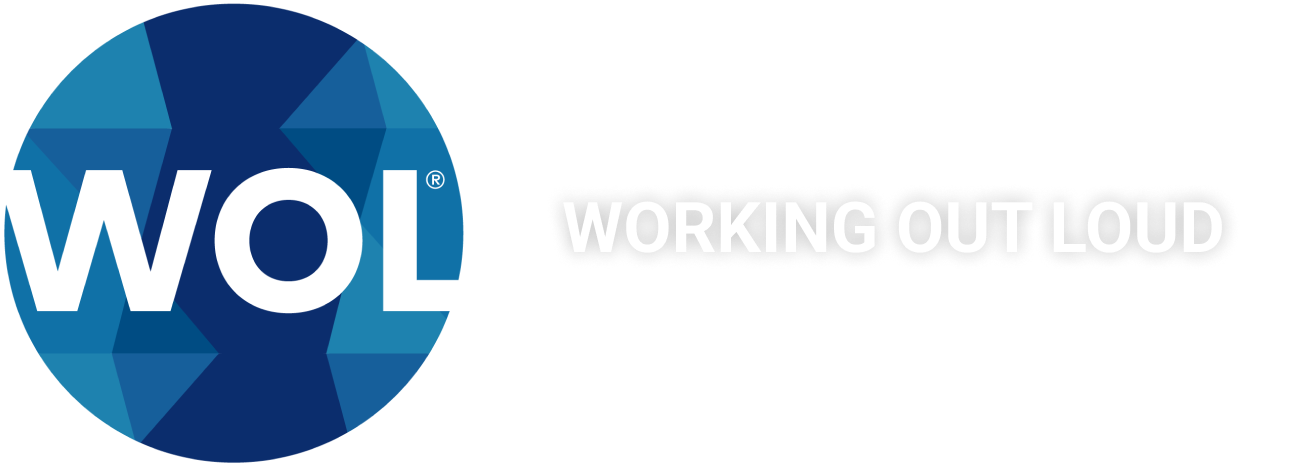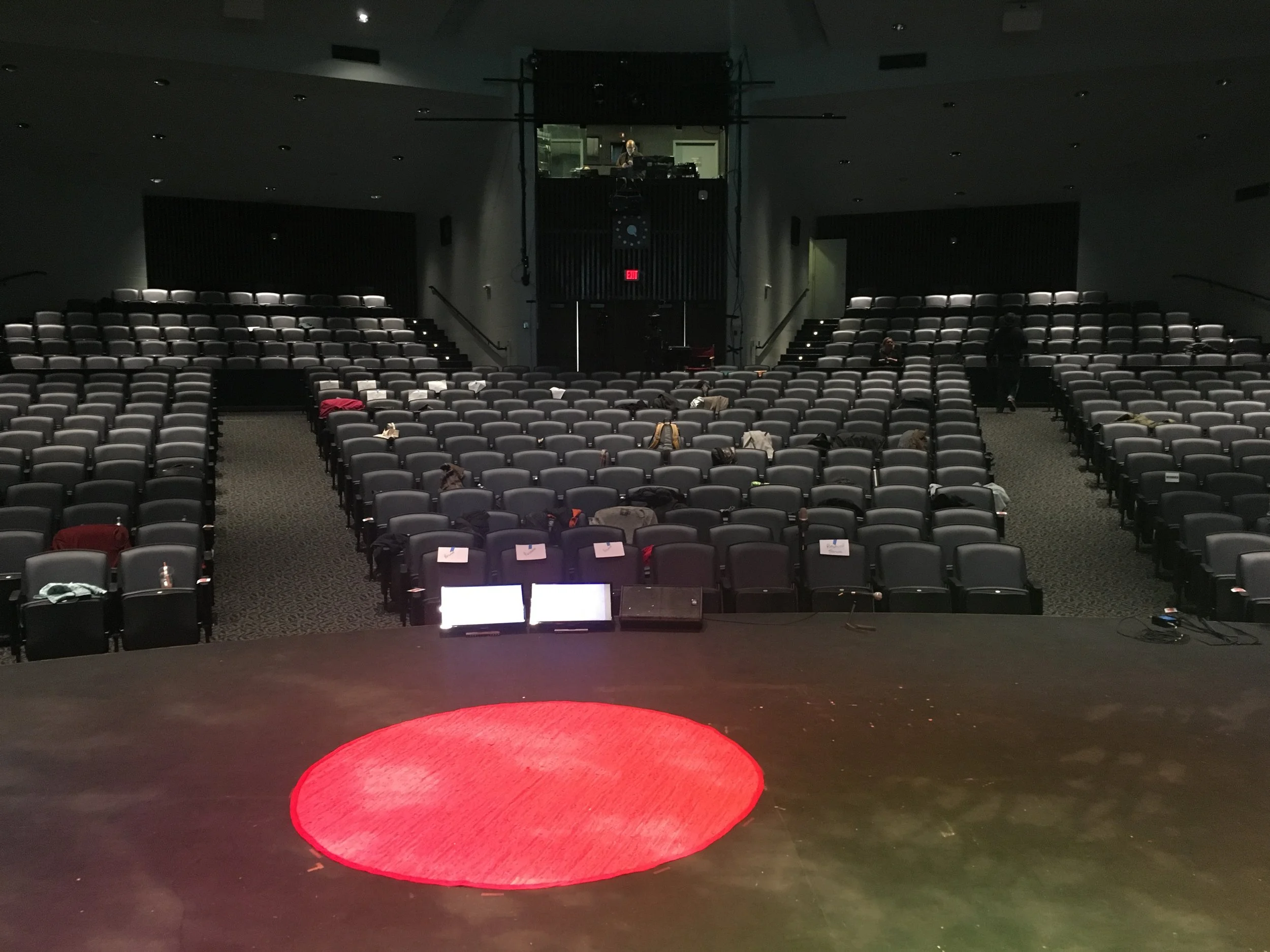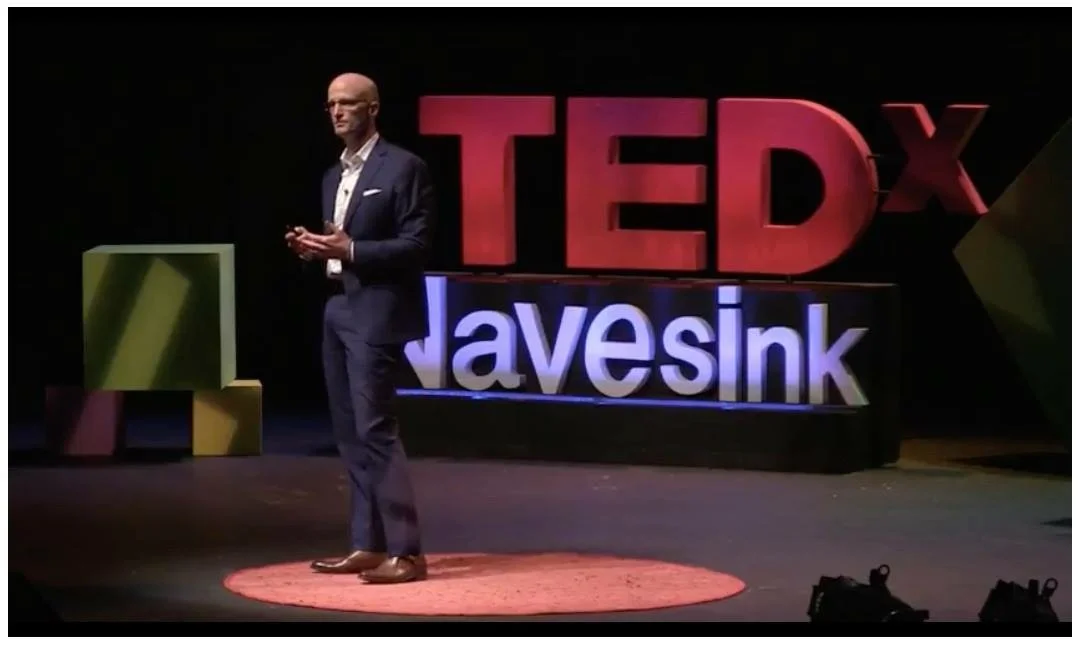“How did the TEDx talk go?”
The talk was this past Saturday, April 9th, just after 4pm. I was so far outside my comfort zone that the uneasiness lasted for months, punctuated by alternating fits of excitement and panic. In hindsight, it was more like acting in an eight-minute movie than like any presentation I had ever done.
People who knew about the event will naturally ask, “How did it go?” The most direct answer is, “It went well.” (Or, more precisely, "it went as well as it did in practice." You can judge for yourself by watching it here.)
The rest of this post offers a longer answer, and describes the process I went through in case it might help you prepare for something similar.
The Red Dot at TEDx Navesink in New Jersey
“Can I give a TEDx talk, please?”
In 2014, my friend Melody was in a Working Out Loud Circle with me, and said she knew some of the organizers at TEDxNavesink. “You should apply,” she said.
I sent an email to one of the them, and we met in a cafe and had a great conversation. I submitted an abstract and was excited about the possibility. But I was rejected.
A year later, the organizer sent me a nice message suggesting I should apply again. The conference theme would be “Makers.” He had noticed that Working Out Loud had spread to many countries and organizations—that I was in the early stages of “making a movement”—and he thought the combination of progress and uncertainty about how far things would go would be interesting to the audience.
I hesitated, my pride still stinging a bit from the initial rejection. Thankfully, my friend Melody said what only a good friend would say: “Are you nuts? Get over yourself and apply!” I did, and I was thrilled when I got accepted.
That was in December, almost four months before the event.
Two months before
A draft of the slides was due in February. I’m used to writing stories and putting slides together, and I submitted my slides with reasonable confidence.
Looking back, it was terrible: 29 slides. Five stories. A long description of my work history and the definition of working out loud. Slides showing the book cover and some statistics. It was boring and would never fit in eight minutes.
A rehearsal with the organizers was scheduled for March 14th via Skype. For this, I needed to write a script but didn’t need to memorize it. To help me prepare, my wife bought me a copy of Talk Like TED and it contained good advice I knew I needed to follow.
I wrote the script and read it out loud several times before my rehearsal. I was extremely nervous. There were five or six people listening, and it lasted only 25 minutes. They gave me helpful feedback on things to include and remove.
I felt relieved. Just a few adjustments, I thought, and I would be all set.
Two weeks before
We went on a family vacation. I shared the latest talk with my wife, and was looking forward to finally having time to go through it together. I re-read the excellent book Resonate to refine the talk further.
But my anxiety was starting to increase. It dawned on me that I needed to memorize this script and I had never done anything like that. Though I’m used to presenting in front of audiences, I always have more time and I’m able to improvise liberally, to interact with people in the room. I’ve never memorized a poem or song lyrics, never mind an eight-minute script.
My wife pointed out several problems, including the need to make the presentation simpler and the stories more powerful. We discussed Ken Robinson’s TED talk as an example. It’s the most popular talk of all time, and yet all either of us remembered was the story he told of a little girl presumed to have learning disabilities. After going to see a specialist with her mother, the doctor turned on the radio and took the mother out of the room. From the window outside, they watched the girl move to the music. “She isn't sick. She's a dancer. Take her to a dance school.” That little girl went on to become a famous choreographer.
We remembered little else, but we agreed that the one story made it an excellent talk.
All my wife's comments were good but I was resistant. I knew that the more I kept changing things, the less time I’d have for memorizing. I could feel my anxiety about to overwhelm me, and the talk consumed my thoughts. During the vacation, I kept editing and simplifying and sending my wife new versions. Chip, chip, chipping away until the story became simpler and smoother. I sent updates to the organizers too. They needed final slides and had their own feedback. Towards the end of the trip, my wife finally began to like the talk.
It was remarkably better than what I had rehearsed just a few weeks earlier. Now it was just 15 slides and three stories. No long history or definitions or statistics. No book cover. Two of the stories were expanded and took up almost half of the eight minutes.
I start to work on memorizing it. By Wednesday, three days before the event, I was able to record myself giving the talk without notes.
Two days before
On Thursday evening, I gave the talk in my living room in front of my wife and two friends. At this point, I had submitted slides. I was certain I couldn’t change anything and still have time to memorize it. But my small audience pointed out three key adjustments that proved to be crucial.
“Be yourself.” I was so focused on repeating the words I memorized that I wasn’t sounding authentic. The more I could relax and be myself, the more the audience could relate to me.
“Lighten up.” The tone was so serious! My wife suggested a few comments I could make to bring some life and light to the talk, and make it more engaging.
“Say it clearly.” My tendency to write in overly-complex sentences was coming through in the talk, and at times the many clauses and sub-clauses would lead me to mumble. Simplifying the language in places, and enunciating the key words would make it easier to understand.
I made the changes the next morning and made a new recording. Then I headed to the event for a rehearsal at the venue. I entered the theater 15 minutes before my scheduled time, and that was a mistake. Everything was so new: the room, the people, the microphone, the red dot. I began my talk and almost immediately lost my place. By the second slide, I realized I couldn’t continue.
“Can I start over?” I asked. My heart was pounding. Start over?!? That’s the worst thing that can possibly happen! I must have looked panicked. The speaking coach kindly asked if I would like some water.
I made it through on the second take, and sat in the audience watching other speakers rehearse. I noticed several other people stumble, and realized that’s what rehearsals are for, to get familiar with the environment. I went back to the hotel and practiced.
On Saturday morning, I got up early and practiced more. Thanks to Nicola, my extraordinary friend and a personal stylist (and also a WOL Circle member), I brought my best blue suit, white shirt, new brown shoes, and even a neatly tucked-in pocket square.
I felt good, confident, and still anxious. I got there by 9am just as the event began. There were still seven hours remaining till my talk.
Two hours before
The talks in the morning were excellent. The crowd, estimated at 700 or so people, was clearly supportive and encouraging. All the organizers and volunteer staff were lovely, helpful, and well-prepared.
My wife and friends came during lunch. They got a seat near the front and I sat next to them, mouthing my script as I continued practicing. It relieved my nerves.
I texted my friend Eve, a singer and actress (among other talents), and asked if she had a ritual before she performs. She shared hers with me and I decided to borrow it for the day.
An hour before, I’m in a small room with other speakers about to go on. I know that other people do this every day - perform on TV and in plays, give talks—but it feels so new to me. I rehearse how I will say thank you to the person introducing me. How I will advance to my first slide when I step onto the red dot. How I’ll smile and look around the room before I begin.
Ten minutes before it’s my turn, they lead me down a dark hallway behind the stage. They put on my microphone and hand me a clicker. “Don’t press it. It’s live and controls the slides on stage.”
Tick, tick, tick. I do a power pose (thanks to Amy Cuddy's TED talk), whisper my opening line, and recite Eve’s mantra. Then I do it again. And again. I hear the applause for the last speaker, then a short introduction and my name. I bound onto the stage and into the light. I click to advance to my first slide.
As I’m speaking, I’m aware of what I’m saying but I feel oddly detached, as though it's a kind of out-of-body experience. I hear the familiar words and notice the minor mistakes. I advance one slide too quickly, but catch myself and make the point I had intended without anyone noticing.
In the middle of the talk, I’m thinking that it’s all going by so quickly. Perhaps I’ve missed something. But the slides and words are familiar now, and it’s just my experience of time that has changed. Slide by slide, I’m increasingly relaxed and confident, and for my final slides I’m fully present. Then it's over. I hear the applause, and walk off stage.
Afterwards
I feel weightless afterwards. The burden of the talk having been lifted, I am light and unencumbered, not thinking about anything.
I walked back into the theater, watched the final talks, and met up with my wife and friends, who congratulated me. I checked for messages for the first time since the event began, and so many people had posted comments, Likes, tweets, texts, and emails. It was a beautiful outpouring of support and something I’ll never forget it. Later, at a reception, we all met other speakers and attendees and organizers. I had a glass of wine, and I felt happy and fulfilled.
Once we got home, I fell asleep almost immediately.
The next day, I noticed a shift in my thinking. Before the event, I was afraid of being on camera, and I’ve almost never looked at any recordings of myself. I was also too embarrassed or shy to invite people to the event. But at a spontaneous get-together for dinner, a group of friends watched the talk my wife recorded on her phone.
As we watched, I didn’t feel any embarrassment at all. I didn't feel pride either. I was just comfortable saying—to my friends and to the world—“I made this. I hope you find it useful.”



